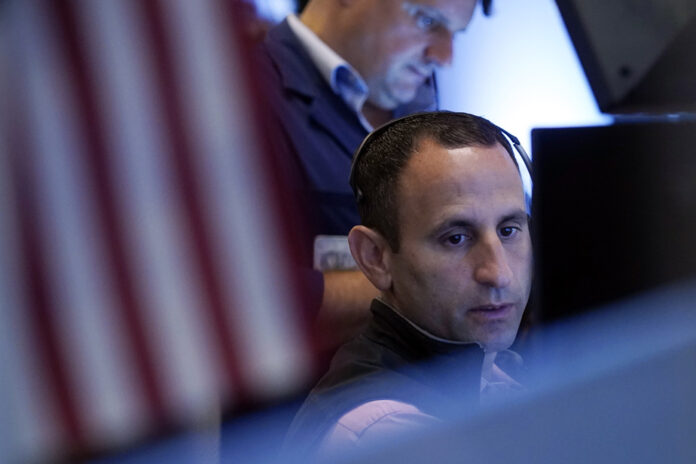(New York) The New York Stock Exchange ended Thursday with no direction, the NASDAQ nevertheless narrowly signing a fifth consecutive session of gains, awaiting the publication of the US employment report for August on Friday.
The Dow Jones index lost 0.48% to 34,721.91 points and the S
In a sparse trading session heading into the Labor Day long weekend, the market digested a new inflation gauge, muted by expectations of a crucial report on Friday, that of job creations. jobs for the month of August.
“We had a nice rally in the market the last week, now the market is taking a break to digest this rise which is perfectly normal and healthy before the big numbers in the jobs report,” Adam Sarhan told AFP. of 50 Park Investments.
Analysts expect new hiring to slow to 173,000 with the unemployment rate up slightly to 3.6%.
The stock market gains of recent sessions have reduced the losses of a difficult month for the indices, which however ended with a monthly drop of more than 1%.
On Thursday, the Commerce Department released the statement of household spending and income for July, which showed an increase in spending (0.8%), which was stronger than expected.
The PCE inflation index based on these consumer spending came out as expected at 0.2% over the month. Over one year, the rise in prices however accelerated to 3.3% against 3% in June, according to this barometer preferred by the Federal Reserve (Fed) to gauge the evolution of prices.
Ben Ayers, an economist at Nationwide, said rising prices for services in particular “challenges the idea that the slowdown is at work and may worry Fed officials ahead of the committee meeting. monetary policy from the central bank in September”.
Oanda’s Craig Erlam said the inflation data “was in line with expectations and good enough to allow the Fed to pause next month” in rate hikes. “It’s ok so far, but still needs a lot of improvement over the next few months,” the analyst added.
Among the other indicators of the day, the PMI index of activity in the industrial region of Chicago improved in August (48.7 points against 42.8 the month before), but remained in recession.
Weekly jobless claims fell by 4,000 to 228,000.
On the bond market, ten-year rates on Treasury bills fell to 4.09% from 4.11% the day before. However, the dollar has strengthened.
On the stock side, Salesforce, the customer relations software giant, posted stronger-than-expected earnings and revenue and raised its full-year sales forecast to $34.8 billion, including through the development of artificial intelligence. The stock climbed 2.99% to $221.46.
The title Shopify was highly sought after (10.80% to 66.49 dollars), after the group of services dedicated to e-commerce reached an agreement with Amazon to use its logistics network.
Shares in discount chain Dollar General tumbled 12.16% to $138.49 after, like many retailers, the group slashed its sales and profit outlook for the year, again citing a more cautious consumer and an upsurge in theft. Its competitor Dollar Tree lost 1.71%.
Cryptocurrency exchange Coinbase fell 5.05% on the heels of a decline in bitcoin (-3.98% at 4:20 p.m. EST) and strong gains since Tuesday following a decision to justice which should authorize, to the chagrin of the stock market policeman, the SEC, the listing of investment products (ETF) based on bitcoin.
The strength of the information technology sector, mainly attributable to the stock of Shopify, was not enough to prevent the benchmark index of the Toronto Stock Exchange from closing lower on Thursday, while the major American stock indices ended the session in a dispersed order.
Markets saw “pretty modest activity” on Thursday, observed Brian Madden, chief investment officer at First Avenue Investment Counsel.
“This contrasts with the strong rise in the first three days of this week, and with the strong sell-off in August in general,” he said.
The composite index S
In Canada, markets are torn between opposing forces, Madden explained. Earnings at CIBC, the last major Canadian bank to report results this quarter, were below expectations. This particular bank saw “remarkable weakness” in its stock, he noted, which fell more than 3%.
Overall, the more cyclical sectors of the market, including real estate, financials and industrials, dragged the Toronto floor down, Madden continued.
But on the other end of the spectrum, Shopify’s stock surged Thursday after announcing its deal with Amazon, he noted.
This week is important for economic data, particularly in the United States, and markets had strong sessions on the heels of the release of a series of reports that boosted confidence in the cooling of the economy. economy under the weight of interest rate hikes.
On Thursday, the government announced that a measure of inflation closely monitored by the US central bank had remained weak for the past month.
The labor market report, due Friday, is expected to show weakness, Madden said, as is the manufacturing survey from the Institute of Procurement Managers. In Canada, economists will take note of the latest data on gross domestic product on Friday.
Thursday’s session also capped off a volatile month, mostly marked by broad-based weakness, despite the recent rally, Madden observed.
The Bank of Canada and the Federal Reserve will both present a new interest rate decision in September, and they should maintain their key rates, he estimated.















